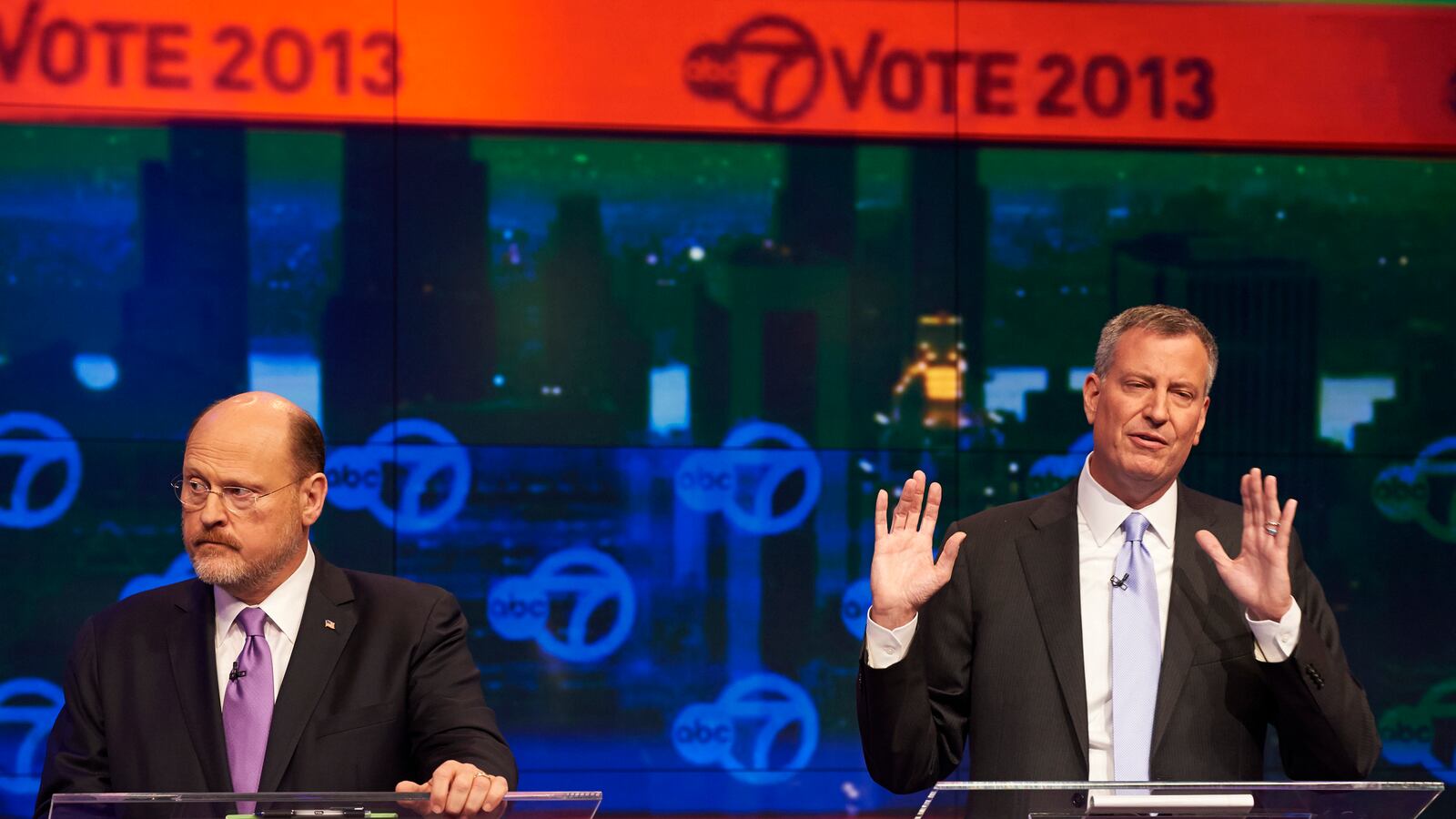It was Bill Clinton against Rudy Giuliani, a successful businessman versus a lifelong pol, a Tea Party true believer versus a left-wing softie.

At least that was how Democratic New York City mayoral nominee Bill de Blasio and his Republican counterpart Joe Lhota painted each other in a tense hour-long debate, the first of the general election season.
Repeatedly, de Blasio said Lhota was borrowing a page “from the Republican playbook” and favoring “trickle-down economics.” The Democrat grouped the former Metropolitan Transportation Authority head and top Giuliani aide with the Republicans in Congress who have brought the nation to the brink of default.
Taking his cue from Ronald Reagan’s debate against Jimmy Carter, Lhota shot back at one point: “Bill, there you go again. You keep talking as if I am some kind of national Republican.”
Lhota ticked off a number of areas in which he disagrees with his national GOP counterparts, including gay marriage and abortion rights.
“Do not lump me with the national Republicans,” he said. “It is unbecoming, Bill.”
Party identification matters greatly in this city, which has a 6-1 Democratic registration advantage. Still, Republicans have ruled Gotham since 1993, including two terms of Giuliani and now three of Mayor Mike Bloomberg, who borrowed the GOP line even as switched his registration to independent. Yet the city is vastly different from the one where Guiliani won in 1993, with more immigrants, fewer ethnic white voters, and few voters of any stripe who remember the days of high crime and perilous city finances that spurred the long string of Republican victories.
Both candidates, however, promised a clear shift from the Bloomberg years, with de Blasio, the city’s public advocate, saying in his closing statement that “we need clear progressive change and a break from the Bloomberg years,” and Lhota bashing the mayor for onerous regulations on small business and—borrowing a page from a central line of de Blasio’s—permitting income inequality to balloon on his watch.
Neither man landed the kind of decisive blow that could change the contours of the race, an outcome that favors de Blasio. The former City Council member has consistently led Lhota by more than 40 points since the September primaries ended with decisive victories for each. But de Blasio, whose come-from-behind victory in the primary stunned most political observers, never let up, criticizing Lhota for raising fares while he was MTA head and for pushing for tax breaks while he worked for Madison Square Garden.
On stage, there were moments when Lhota seemed to allow his frustration to show, grimacing as de Blasio ran through Lhota’s ties to the Giuliani administration, propping his face against his fingers. At one point, when de Blasio, who sat through many debates during the Democratic primary, said Lhota was enabling the same worldview that had led to the brink of default down in Washington, D.C., he threw his arms up in despair, or disgust.
The two sparred on everything from the recent road rage incident in Upper Manhattan in which a group of motorcycle riders savagely attacked a driver out with his family, to charter schools, to inclusionary zoning, to the NYPD’s stop-and-frisk policy, to the tenure of police Commissioner Ray Kelly. For his part, de Blasio sought to allay fears that his administration would represent a return to the crime-filled days of the city’s last Democratic mayor, David Dinkins, for whom de Blasio got his start in city politics. Lhota, meanwhile, was at pains to explain why his mayoralty would be free of some of the division that befell the Giuliani administration, and he painted de Blasio’s Tale of Two Cities campaign theme as divisive. He said de Blasio’s plan to tax upper-income earners would in the end mean a higher tax rate for the middle class.
“Bill de Blasio is a career politician, and every politician that says they are going to only raise taxes on the wealthy also ends up raising taxes on the middle class,” he said. “He will not stop.”
Afterward, Lhota was if anything even more aggressive as he tried to spin the city’s press corps, accusing de Blasio of wanting to “stay in Park Slope and never leave”—a reference to the public advocate’s limited campaign schedule since the primary—and calling the longtime political operative “your typical, classic political hack who doesn’t know what to do when he is in a debate.”
De Blasio stayed on message as well. After a gaggle of reporters was delayed by building security and missed most of his post-debate remarks, he agreed to stand for a few more questions.
“Oh, this is a tale of two cities! Some had all the wealth of information and questions; others were excluded,” he said, putting his arm around his wife, Chirlane. “So let’s give them a chance, too!”






